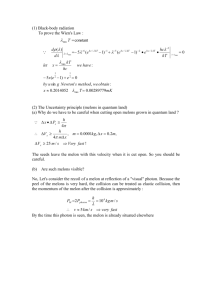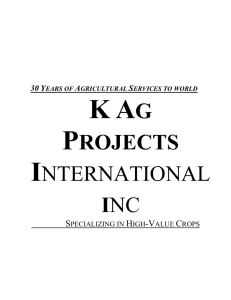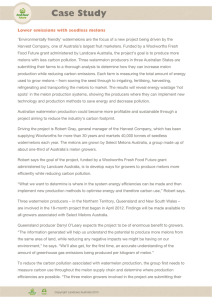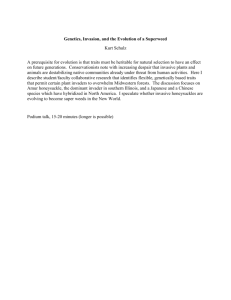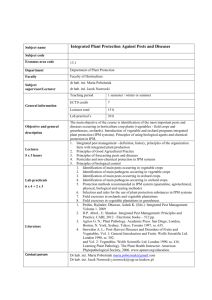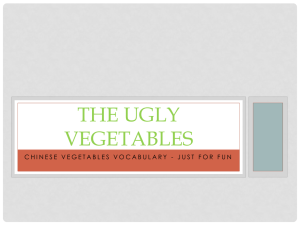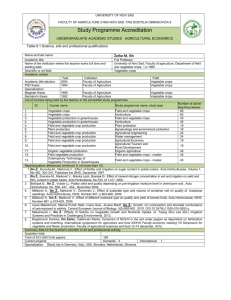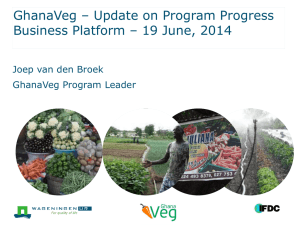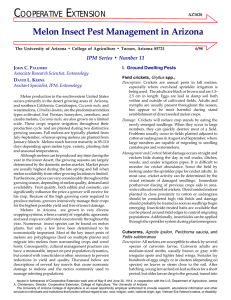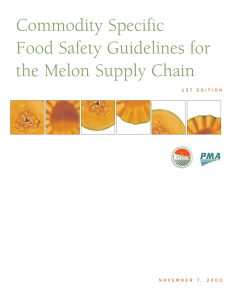Unnamed File - UC Agriculture and Natural Resources
advertisement
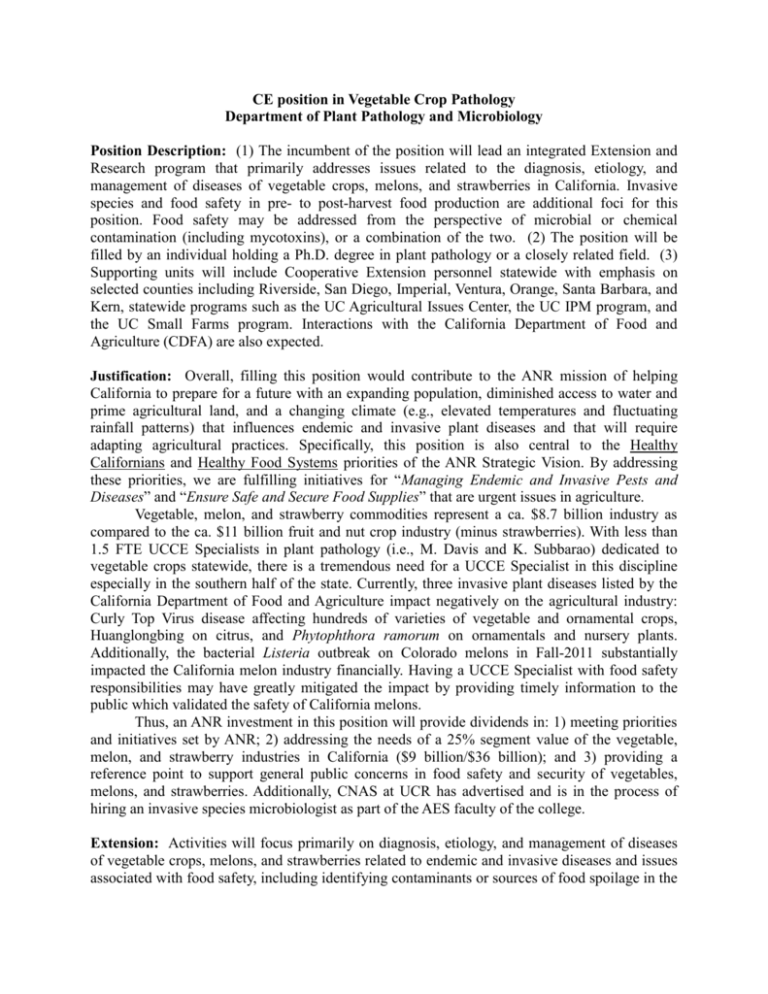
CE position in Vegetable Crop Pathology Department of Plant Pathology and Microbiology Position Description: (1) The incumbent of the position will lead an integrated Extension and Research program that primarily addresses issues related to the diagnosis, etiology, and management of diseases of vegetable crops, melons, and strawberries in California. Invasive species and food safety in pre- to post-harvest food production are additional foci for this position. Food safety may be addressed from the perspective of microbial or chemical contamination (including mycotoxins), or a combination of the two. (2) The position will be filled by an individual holding a Ph.D. degree in plant pathology or a closely related field. (3) Supporting units will include Cooperative Extension personnel statewide with emphasis on selected counties including Riverside, San Diego, Imperial, Ventura, Orange, Santa Barbara, and Kern, statewide programs such as the UC Agricultural Issues Center, the UC IPM program, and the UC Small Farms program. Interactions with the California Department of Food and Agriculture (CDFA) are also expected. Justification: Overall, filling this position would contribute to the ANR mission of helping California to prepare for a future with an expanding population, diminished access to water and prime agricultural land, and a changing climate (e.g., elevated temperatures and fluctuating rainfall patterns) that influences endemic and invasive plant diseases and that will require adapting agricultural practices. Specifically, this position is also central to the Healthy Californians and Healthy Food Systems priorities of the ANR Strategic Vision. By addressing these priorities, we are fulfilling initiatives for “Managing Endemic and Invasive Pests and Diseases” and “Ensure Safe and Secure Food Supplies” that are urgent issues in agriculture. Vegetable, melon, and strawberry commodities represent a ca. $8.7 billion industry as compared to the ca. $11 billion fruit and nut crop industry (minus strawberries). With less than 1.5 FTE UCCE Specialists in plant pathology (i.e., M. Davis and K. Subbarao) dedicated to vegetable crops statewide, there is a tremendous need for a UCCE Specialist in this discipline especially in the southern half of the state. Currently, three invasive plant diseases listed by the California Department of Food and Agriculture impact negatively on the agricultural industry: Curly Top Virus disease affecting hundreds of varieties of vegetable and ornamental crops, Huanglongbing on citrus, and Phytophthora ramorum on ornamentals and nursery plants. Additionally, the bacterial Listeria outbreak on Colorado melons in Fall-2011 substantially impacted the California melon industry financially. Having a UCCE Specialist with food safety responsibilities may have greatly mitigated the impact by providing timely information to the public which validated the safety of California melons. Thus, an ANR investment in this position will provide dividends in: 1) meeting priorities and initiatives set by ANR; 2) addressing the needs of a 25% segment value of the vegetable, melon, and strawberry industries in California ($9 billion/$36 billion); and 3) providing a reference point to support general public concerns in food safety and security of vegetables, melons, and strawberries. Additionally, CNAS at UCR has advertised and is in the process of hiring an invasive species microbiologist as part of the AES faculty of the college. Extension: Activities will focus primarily on diagnosis, etiology, and management of diseases of vegetable crops, melons, and strawberries related to endemic and invasive diseases and issues associated with food safety, including identifying contaminants or sources of food spoilage in the food chain. This will include rapid diagnostics with the implementation of modern pathogen identification systems, advancement of novel disease management strategies, and development of good agricultural practices (GAPs) along with food safety programs in a diversity of production systems. Stakeholders targeted by extension activities include all personnel in the food chain, including growers, processors, distributors, etc. of these commodities. Specific clientele groups for this position are several large and well-organized industries that are centered in the Central Valley, as well as southern and coastal areas. These include a number of California’s most valuable commodities (based on 2010 CDFA data), such as vegetables and melons (listed @ $6.9 billion) and strawberries (listed at $1.79 billion). Several individual vegetable commodities that would be served by this position are: lettuce, tomato, carrot, peppers, beans, spinach, onion, and squash. The CE specialist would interact directly with growers, farm advisors, pest control advisors (PCAs), and other agricultural industry professionals and would also provide information to these individuals through publications and web-based resources. Research: The candidate would be expected to engage in research that aims to detect and manage plant diseases based on pathogen biology and disease epidemiology. Emphasis will be on environmentally sound, integrated approaches to disease management. Specific areas of research may include: detection of endemic and new invasive pathogens, reduction of fungicide use through forecasting based on disease epidemiology, management of fungicide-resistant pathogens, development of biological controls, and cultural practices for disease reduction programs that contribute to sustainability of vegetable, melon, and strawberry crops. Questions that could be addressed in this area include: How to best detect pathogens? What new approaches could be used to manage diseases with and without pesticides? What organisms pose a risk to crop loss or threat to humans in pre- and postharvest systems? What is the source of microbial contamination? How can water sources suffering from bacterial or other types of contamination be disinfected or otherwise purified? How can solutions be provided for both conventional (high-input and low-input) and organic growers? Publication outlets for research may include the journals Phytopathology, Plant Disease, Food Microbiology, Applied and Environmental Microbiology, Journal of Food Protection, Journal of Agricultural and Food Chemistry, California Agriculture, and others. ANR continuum: While horticultural programs exists at UC-Davis that include vegetable, melon and strawberry crops, there is inadequate number of CE Specialists in plant pathology to cover the entire state for vegetables, melons, and strawberries especially in desert and coastal agricultural regions. A key to effective management of invasive pathogens and food contamination is rapid detection, something that would be greatly facilitated by a CE specialist engaged with growers, PCAs, and farm advisors who are among the most likely first detectors. Interactions with CE vegetable pathologists (M. Davis and K. Subbarao), vegetable microbiologist (T. Suslow) at UC Davis, and CE specialists at UC Riverside (D. Mathews, A. Eskalen) are expected, along with county CE in Riverside (J. Aguiar, C. Gispert, T. Shea), Imperial (K. Bali), Ventura (J. Downer, O. Daugovish), Kern (J. Nunez), Santa Barbara (S. Dara, M. Gaskell), and elsewhere. In addition, interactions are expected with other faculty in the home department at UC-Riverside, including M. Stanghellini, J. Adaskaveg, M. Coffey, and others who collectively study the epidemiology and management of pre- and postharvest plant pathogens and microbial contaminants. Support: The department will provide laboratory, greenhouse, and office space within its facilities on the UC-Riverside campus, as well as administrative support, internet access, telephone access, etc. An account manager in the Department of Plant Pathology and Microbiology at U.C. Riverside would handle grant administration and personnel matters. Other support: Numerous commodity groups can be expected to provide substantial monetary support for research and extension programs developed by a CE specialist working on diseases and contaminants of vegetable, melon and strawberry crops. Financial support is anticipated from carrot, celery, lettuce, melon, strawberry, and other commodity boards. Other potential sources of funding include the food processing industry, federal regional projects, and statewide programs such as CDFA. Location: UC-Riverside is centrally situated to support agriculture in major crop production regions of California including Kern, Imperial, Orange, Riverside, San Diego, Santa Barbara and Ventura Counties. These areas produce several billion dollars of food crops per year through a diverse mixture of vegetables (lettuce, bell peppers, broccoli, cauliflower, etc.), melons, and strawberries. UC-Riverside is therefore a logical base of operations for such a position. While an emphasis on Invasive Species and Food Safety in desert crops in these regions is anticipated, growers in other regions of the state are also accessible.
